The common people pray for rain, health, and a summer that never ends. They don’t care what games the High Lords play.
-Ser Jorah Mormont (Iain Glen)
One of the most prominent themes in George R. R. Martin’s A Song of Ice and Fire is that of the plight of the common folk. A Game of Thrones begins with a feudal, medieval society ruled by noble houses, from Winterfell in the North to Sunspear in the South. A crumbling marriage between two such houses is holding the realm together but one only has to have a basic understanding of aristocratic oligarchy and inequity to know where the peasantry lies within this system of power. At the conclusion of A Game of Thrones and the first season of the television adaptation, that marriage is crumbled and a devastating execution lights the fuse of hatred and turns it into a full-fledged conflagration.
A Clash of Kings and season two chronicle the meat of what is eventually known as the War of the Five Kings. As battles rage throughout Westeros, ravaging the Riverlands in particular, no end to the war is in sight. War, as one imagines, is prohibitively expensive and the drainage on the crown’s coffers is certainly not going to be refilled by the Lannisters. The coffers are going to be filled by taxes upon the peasantry and the poor of King’s Landing.
A Storm of Swords and seasons three and four lead up to the two climaxes of the war, respectively. The slaughter of the Starks at the Red Wedding is arguably the conclusion of the primary military conflict of the war. The assassination of Tywin Lannister (Charles Dance) by his son Tyrion (Peter Dinklage) signals the end of the political arm of the war. The assassination in particular, as Cersei (Lena Headey) notes with such vehemence in “The Dragon and the Wolf,” left the Lannisters ripe for the picking. However, the ones whom are the most ripe for the picking are the common folk.
A prevalent thematic motif of stories that have significant aristocratic characters is the relationship that develops between the children of aristocrats and the children of the peasants who are hierarchically beneath them. In Winterfell, a young Arya Stark (Maisie Williams) finds herself without many companions her age who wish to pursue the interests of fighting. She finds a friend in Mycah (Rhodri Hosking), sparring with him on her journey south to King’s Landing before an encounter with Joffrey Baratheon (Jack Gleeson) takes a turn for the worst.
Joffrey is an entitled, sociopathic brat but he is an aristocrat. He proves his weight by relying upon his name, his wealth, and the power they provide. A young man of immense insecurities, Joffrey feels the constant need to assert his masculinity and poor Mycah pays the price for being a disposable peasant. He parlayed as an equal without claiming to be one but his fate was an initial proof that even the pretense of equality between a peasant and an aristocrat was dangerous.
When Theon Greyjoy (Alfie Allen) is tricked by Osha (Natalia Tena) to allow her to spirit Bran (Isaac Hempstead-Wright) and Rickon (Art Parkinson) away, Theon’s sense of masculinity is similarly belittled. He thrashes out just as Joffrey had done and when he could no longer bear the time to find the two escaped children, he instead opts for a different method of reasserting his name and power. Nearby were two farm boys, whose crime at the moment was simply existing. Theon has them murdered, burnt, and hung up upon the gates of Winterfell.
As the War of the Five Kings rolls into an earnest conflict, Tyrion Lannister (Peter Dinklage) arrives in the capital to prove his true worth to his father. A politically savvy man, Tyrion understands that the war embroiling Westeros has consequences. An immediate consequence of war is the refugee crisis. As the Riverlands in particular are ravaged by the onslaught of warring armies, the peasantry and the poor are forced to flee with their loved ones and the few belongings they can carry on their backs (even then, the danger of your possessions being stolen along with your lives is ever-present).
The peasantry and poor flee to the places where there is some greater likelihood of survival, the places where they have a greater chance of feeding their children as their farms have been destroyed and their homes torched to the ground. In the cities, there is no sanitation and the living quarters in Flea Bottom are well-described by the name but there is theoretically some money to be had. The war is being paid in part through taxes levied upon the peasantry and the poor and that has a significant effect upon the populaces already living in cities as well. Tyrion’s concerns do not faze the unconcerning Queen Cersei Lannister (Lena Headey), who simply has the city’s gate barred against the refugees desperate for salvation.
Barring the gates, as one would expect, does almost nothing to assuage the plight of the people within the gates. The population of King’s Landing, after all, is well over half a million and the vast majority of that population does not inhabit the Red Keep or a noble’s villa. Conditions continue to worsen significantly within the gates of the capital and after the departure of Myrcella (Aimee Richardson) to Dorne, a full-fledged riot breaks out in the streets of the capital. Vehement insults and demands for bread ring throughout the air. Joffrey’s response is to order the guards to murder the townsfolk. A full on riot erupts in the capital and the High Septon is torn limb from limb.
The consistency of the writing in regards to the plight of the common folk is the aristocratic worldview that shapes their existence. Their lives are considered to be less than, to be the negligible stepping stone because the nobility must rule over someone. Even those nobles who do not espouse an open disdain for the poor as Cersei does still see the system as the one that works for it keeps them in power. Margaery Tyrell (Natalie Dormer) steps in as a voice of reason. She has the capacity to understand that the well-being of the common folk is critical and has a certain sympathy for those who do not have access to her privilege. Yet she also understands that the well-being of the common folk helps keeps the nobles in power in the first place.
When there is a dominant worldview that is seemingly collapsing, the priorities of people begin to change. The royalty and nobility for many folks lose the credibility of governance with their vehement refusal to step away from the politics of war and the largesse of their opulent existence. The corruption is slowly seen as having made its way from the Red Keep and into other institutions that have been revered for centuries. As the assassination of Tywin is still hanging over the air of King’s Landing with a virulent stench, a new movement comes afoot in the capital’s alleyways: a movement called the Sparrows.
The Sparrows’ rise to power, if handled a bit indelicately by the series, is explained quite pointedly and poetically by the High Sparrow (Jonathan Pryce). A misogynistic, homophobic hypocrite himself, the High Sparrow nevertheless is sharp enough to also capture what Margaery had. He is able to understand the importance of providing basic support for people and just as importantly he was able to execute that understanding when there was a severe need for that type of support. People in obsessing over fanaticism often lose track of where its support comes from. In this case, it was bread, soup, and water, responsibilities that ostensibly belong to the crown.
A personal relationship that underscores the theme of the common folk being sacrificed for the sake of the aristocrats is the one between Hodor (Kristian Nairn) and Bran. When the audience meets Hodor, he comes across as a gentle, harmless, and friendly giant. When the usage of Bran’s legs are taken away from him, however, Hodor’s role changes. He goes from being a friend to being his protective father figure, keeping him safe until his final moments.
In what is one of the most heartbreaking sequences of the entire series, we see a young Wyllis (Sam Coleman) standing in the idyllic courtyard of Winterfell. His eyes suddenly turn inwards as a consequence of Bran’s interference with time and he collapses onto the stone courtyard. A younger Old Nan (Annette Tierney) rushes towards her great-grandson in horror, repeating his name as he repeatedly yells “Hold the door!” into the frigid air.
The adult Hodor’s death is cruel in and of itself, wights clawing and chomping away at him in the frigid air. The truth of his life is arguably much crueler, one that was in many ways never his to live in the first place. Whether intentional or not, the lack of agency in Hodor’s life is thematically a perfect exploration of the series’s motif of how the agency of common folk is repeatedly taken away by aristocrats. The damage in this case is unintended but the consequences are real.
The consequences are real for the peasantry and poor of the Riverlands in particular. It is an ill-fated area in wartime, the Westerosi equivalent of Poland if you will. It is a fertile yet flat area, with few natural boundaries serving as barriers to invasions and raids. Its geographical location of being in the center of the continent does little to alleviate the destruction the Riverlands face whenever arms are taken up around them. The poor folk of the Riverlands, lacking the fortified walls of Riverrun, fare the worst.
The Hound (Rory McCann) and Arya walk into a dilapidated inn and the setting for the misery of the Riverlands deepens. The immediate sense within the inn is that of misfortune. The innkeeper is destitute, forced to serve whatever meals and ales the Lannister soldiers request at the pain of imminent death and assault upon his daughter. The innkeeper and his daughter as commoners caught in this war have little choice but to acquiesce to the soldiers’s demands. Their only reward is not falling upon their swords.
The final shot of “Two Swords” is that of the Hound and Arya riding out of the inn with their precious chicken and horses into the hellish landscape of the Riverlands. Smoke is rising indiscriminately throughout the grassy plains, breaking through the overwhelming bleakness of the morbid color palette and rising into the gray sky. From the inn the unlikely pair make their way towards an idyllic farm whose owners had fallen into the most difficult of times.
It is often said that those who are less fortunate are more readily willing to share what little they have with others for they know what it means to have little, to have less than what is desired and even necessary. The farmer and his daughter were such people, destitute and worried about what the oncoming winter will do to them. Nevertheless, they saw what they assumed to be yet another pair of impoverished father and daughter wandering the war torn Riverlands countryside, trying to the some refuge and solace in their desperation. They offer the pair food, warmth, and shelter in these trying times.
The Hound repays their generosity by stealing their last bit of gold from them. Arya is aghast at this turn of events, fiercely arguing that it was inherently wrong for him to steal from folks who would surely perish without that diminutive amount of financial assistance. The Hound shrugs it off, noting that the farmer and his daughter were quite likely to die soon thereafter, regardless of whatever amount of gold they had remaining in their repertoire. He was likely speaking an uncomfortable truth about the longevity of the farmer and his daughter, but the dishonorable nature of his actions is unquestionable.
In “Dragonstone,” the Hound finds himself back within that ramshackle structure where he had left the farmer and his daughter destitute. In a dark corner of the structure, however, lie their skeletons quietly gathering dust. The farmer and his daughter were near death from starvation before their eyes closed forever. To ensure that his daughter did not suffer a prolonged and painful death, the father stabbed his daughter first. The pain of starvation and seeing his child die in front him drove him to stab the knife into his flesh.
As Sandor and Thoros of Myr (Paul Kaye) dig two graves amidst the frigid dirt to atone for the former’s sins, the latter asks a simple yet profound question: did Sandor know the farmer and his daughter? Sandor takes a quiet moment and admits that in many ways he does not, but that he knows that they deserved a better fate, a better life.
In that moment, there is a sadness expressed for the fate of a farmer and his daughter who were kind enough to share what little they had with others. There is also a profound grief for the thousands, if not millions, of common folk who waste away in war after war and receive perhaps a penny or two for their sacrifices. There is a tragedy that many who die for the glory of a certain house or for someone’s right to sit on the most uncomfortable chair likely will not even receive the quiet dignity of a grave after their tumultuous lives and forgotten deaths. They will simply be forgotten by most, save perhaps for a lone soul or two who manage to find some empathy buried deep within their hearts.
Valar Dohaeris,
Akash Of the Andals
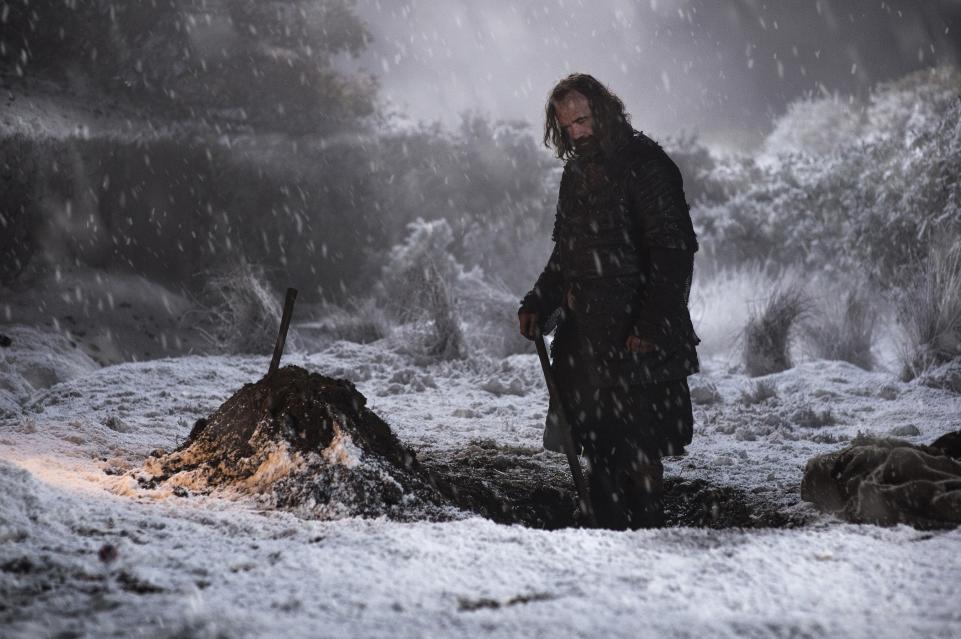
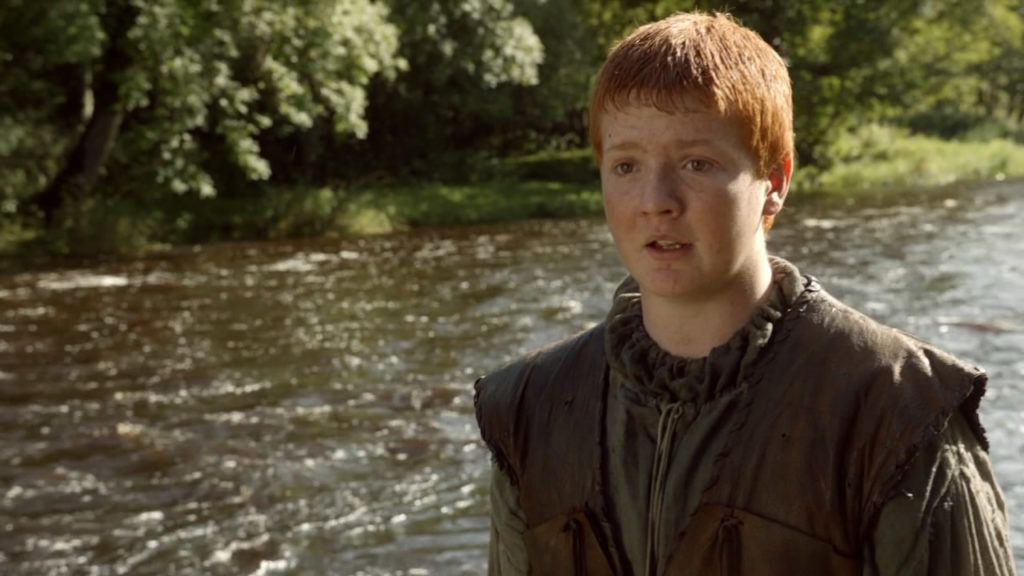
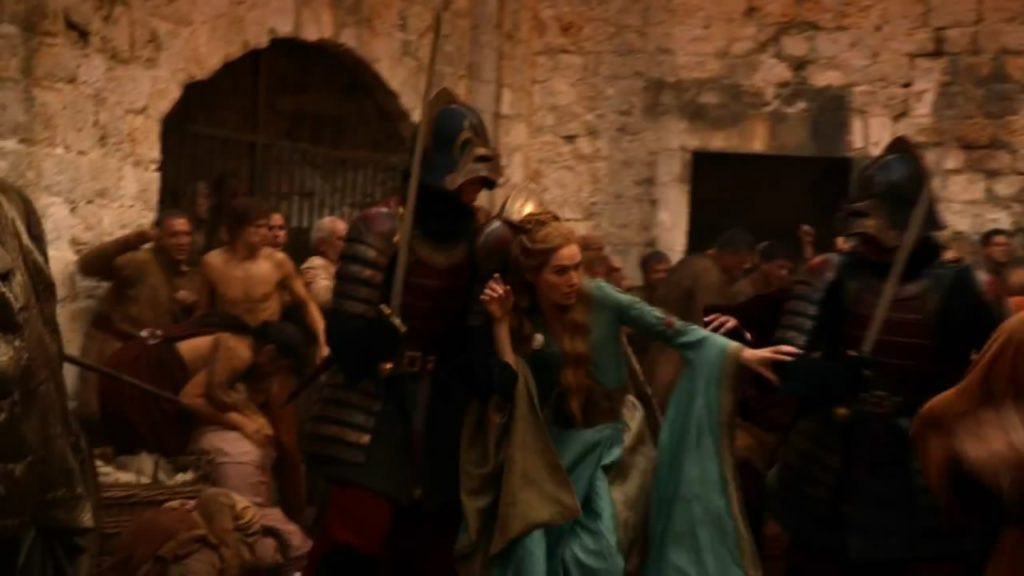

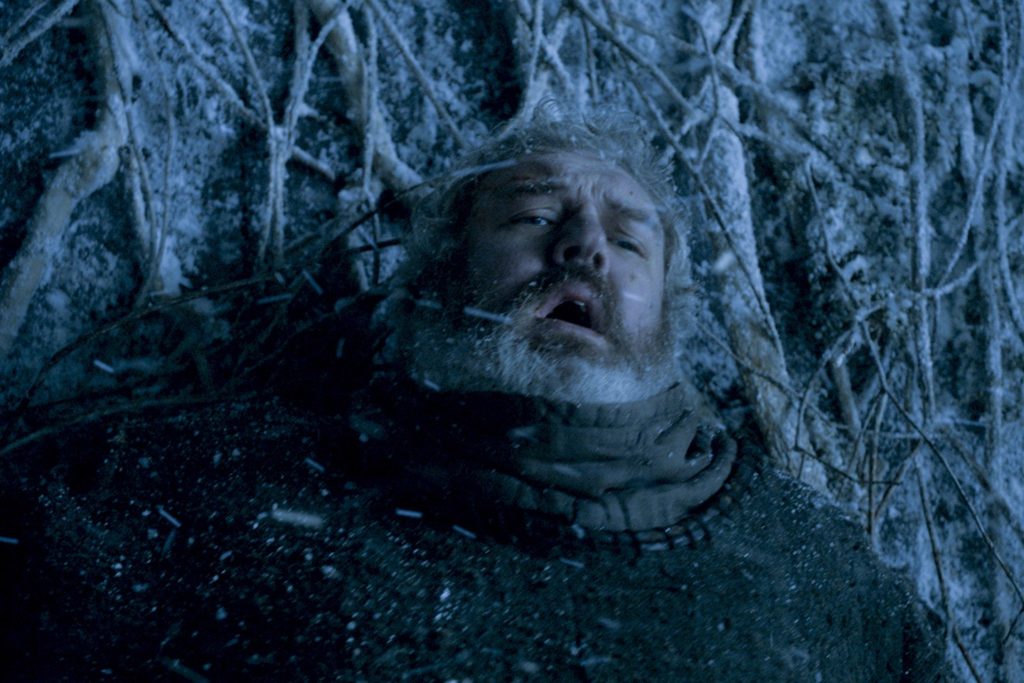
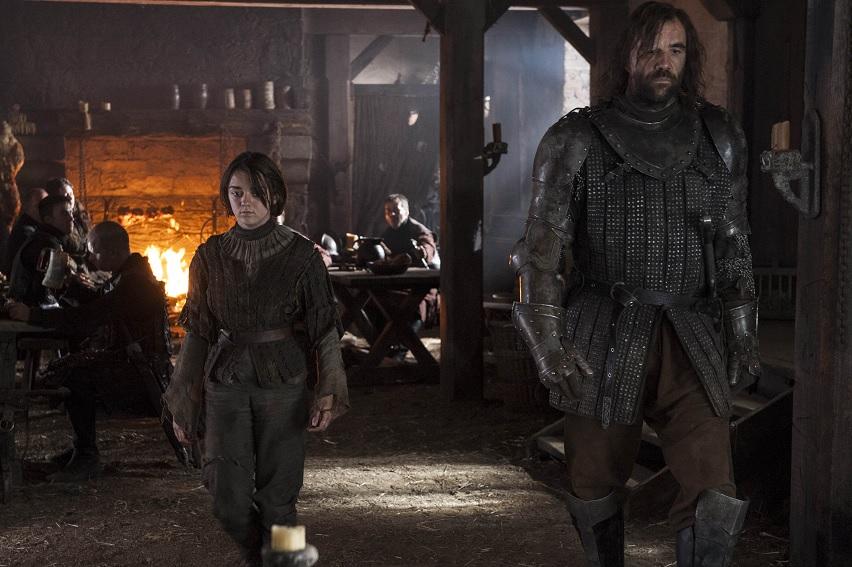
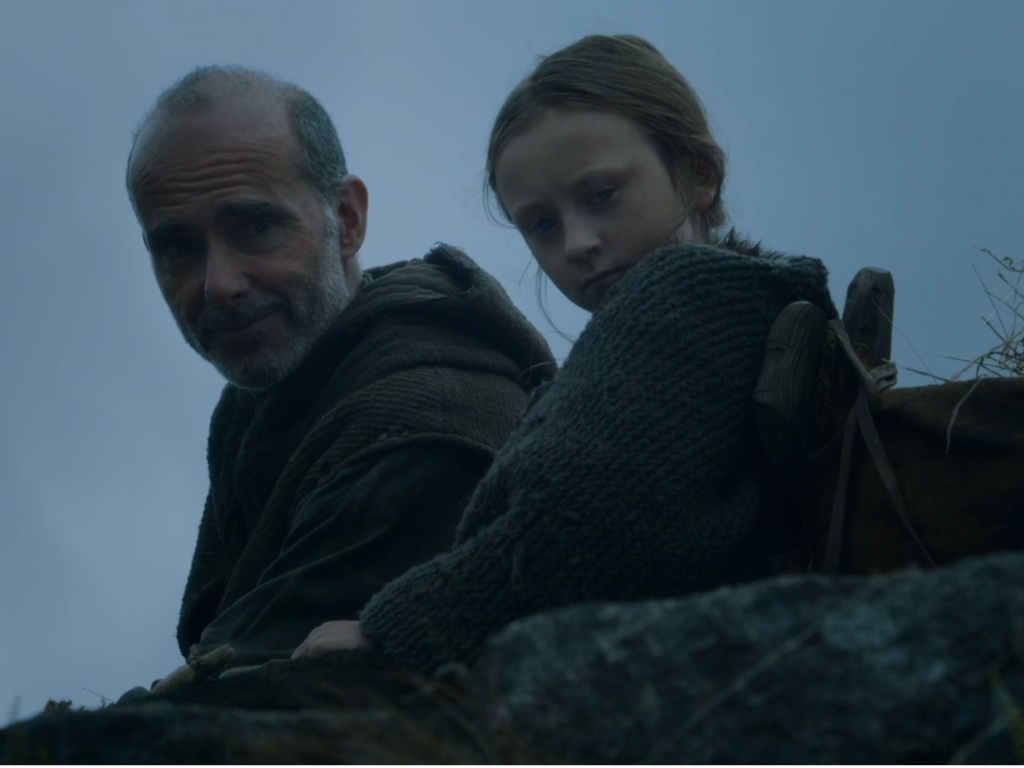
Well said. This was a very touching article. I appreciate you talking about the commoners in Westeros, since much of the story features the lives and actions of the gentry.
“A full on riot erupts in the capital and the High Sparrow is torn limb from limb.” You mean the High *Septon, yes?
Fantastic article! One of the most depressing themes when reading Feast for Crows is the fact that readers finally see the depth of destruction that wolves and lions, and other houses, have made along the countryside. I also liked how you brought up Hodor because in one of those visions when he’s about to spar with Ned, Old Nan comes to put a stop to it before it even starts: “Do you mean to fight little Lordlings, Wylis?” Too bad no one did the same for Micah.
One of my favourite dialogues from AFfC is Septon Meribald’s converstaion with Brienne about “broken men” which I was happy the show adapted in the episode “The Broken Man.” And I’m happy that GRRM took the time to address the ravages of war on the commonfolk and on their land.
“Whether intentional or not, the lack of agency in Hodor’s life is thematically a perfect exploration of the series’s motif of how the agency of common folk is repeatedly taken away by aristocrats.”
😡😠
Great article. I’m from Poland by the way but I never realized that Riverlands analogy. So so true though. Geographically screwed.
“There’s no divine justice, you dumb cunt. If there was, you’d be dead…and that girl would be alive.”
– Sandor Clegane to Beric Dondarrion, about Rabbit Stew Sally.
This was really excellent! You’ve elaborated upon one of George RR’s themes. Many “fantasies” seem to focus entirely on the upper classes, with the smallfolk just being disposable props, if there at all. A big part of Tyrion’s arc seems to be a growing awareness of the lives of the rest of the world.
I’d like to add that, at least in the books, when the Hound expounds upon all the people he’s killed, high and low, rich and poor, men, women and children, there’s a lot of bitterness there, and anger that he’d been ordered to kill them. Not at all the triumphant bragging that most – I’m looking at YOU, Robert Baratheon – would do. Of course, Rory McCann’s Hound isn’t the same as the one in the books (American audiences couldn’t handle Sandor Clegane), but he’s done a great job with many of the essential features of the character and is one of my favorites.
Dark Sister,
I loved that speech in the book and appreciated the amount of it the show was able to use, basically saying the same thing without using the speech in its entirety. Very powerful and moving, as was this post. Thank you for writing it.
Excellent article, Akash! That quote from Jorah that opens the article has always stuck with me as the series has progressed. While most of the major characters in Game of Thrones belong to the nobility in some form, I think that the show has done an excellent job of showcasing the plight of the common folk via these scenes that you recounted, and others as well. Another scene I love which fits in with the others discussed in this article is in “Mockingbird”, when Arya and the Hound come across the farmer who is slowly dying from a stab wound in the gut inflicted by unknown raiders, and they grant him mercy. The actor (Barry McGovern) really conveys how hellish his life has been as the War of the Five Kings has raged (“Who were they?”/”I stopped asking a while ago.”). And yet he goes on, if for no other reason than “habit”, even when he knows that there’s no hope of things getting any better. It’s bleak, but quite evocative, and speaks to just how powerful the stubborn desire to live and find some semblance of normalcy can be, even in the face of extraordinary horror.
The sequence in “Dragonstone” where the Hound returns to the home of the father and daughter that he robbed remains one of my absolute favorites of the entire season. The conversation between Beric and Sandor and the eerie vision in the flames are part of a perfect prelude, but it’s the image of Sandor and Thoros digging graves in the snow for a nameless man and his daughter that provides this sequence with its visual beauty and emotional power. Quiet. Contemplative. Gorgeously written, shot and performed.
To my knowledge, only Kate Elliot’s Crown of Stars series focuses a great deal of its attention on the lives of the more ordinary people as well as the “nobility”. Prince of Dogs, the second book in the series, is written largely from the perspectives of two children surviving on their own in a war ravaged medieval town. In GOT the plight/predicament of the common people is presented from time to time. The attempt to discuss the challenge of shifting a slave worker based economy into something else got bogged down during the Slavers’ Bay storyline. Dany came off as the “Great White Savior” who couldn’t really pull of liberation. It will be interesting to see if The Brothers without Banners will emerge as a force to at least have a seat at the table, since some of their men have chosen to fight with Jon Snow. To use purely political science terms, the Wildlings are the closest thing the Westerosi have to a proletarian meritocracy. I guess between these two groups there is the possibility of something of a nascent democratic populace. And yes I know I am being a smart aleck. It’s Saturday.
Riverhawk,
I do agree with you. All the predicament of the common folk serves only as a background or an impulse for the high-born protagonists’ decisions. We don’t have any commoners as characters in their own right (Davos or Varys or Grey Worm are not commoners any more). This is something I don’t like that much. But what I like is that the common folk is not idealised: we have some good commoners, but the mob of KL riots blindly, cheers when Cersei is marched naked through the streets and then when Euron parades his prisoners through the same streets. In Mole’s Town we had those pretty unpleasant whores, in Meereen we had Mossador, etc. So, to summ up we can quote the Queen of Thorns: people are like children, they need an authority to fear otherwise they get really terrible. I had hopes that the KL plot will end up with some public revolt against Cersei through which the smallfolk will get some agency and respect, but they are gone now. So, Westeros has the system of government it deserves – it still has to grow to earn somethig better.
Thank you, Akash, for your very moving article addressing a societal problem generally overlooked by the wider fandom (here at WotW it does get discussed). Most of the highborn haven’t a care for the lowborn, nor any exposure to them other than as servants. For most of the highborn, the lower classes exist for their convenience, and are consigned to their fate of being victims of torture, rapine, and at best indifference. This attitude is clearly true of Cersei, Joffrey, and Tywin. Margaery and the Sparrows were better yet hypocritical: helping the poor was good and uplifting, but a step towards power. Most Starks, in contrast, not only cared, but even tried to bring the poor Justice when they were wronged. Ned did this from the IT, Arya did it with Needle. Robb cared about his men, but more important wanted to emulate his father. He told Talisa that Ned woke up and went to bed worried about the smallfolk, from the woman who scrubbed the floor to the man who guided the plow. Robb and Jon both cared and even brought understanding and some help to the enemy! Daenerys, for all her obsession with the IT as her birthright, was abused and ‘sold’ and came to list among her retinue former slaves. If by the end of Ep 8.6 any progress towards a more equitable Westeros is made, it will be due to empathetic highborn like these, who instinctively or deliberately are breakers of the despicable wheel.
By the way, am I the only one here who was uncomfortable with fan dismissal of the deaths of the “red shirts” in Jon’s expedition in Episode 7.6? One of my favourite scenes in S7 was learning about the lives of Lannister ‘red shirts’ who shared their humble meal with Arya. For a brief, shining moment we got to know the people who probably became Drogon fodder on the Field of Fire in 7.4. As John Donne wrote:
No man is an island,
Entire of itself.
Each is a piece of the continent,
A part of the main.
If a clod be washed away by the sea,
Europe is the less.
As well as if a promontory were.
As well as if a manor of thine own
Or of thine friend’s were.
No; count me in, too. While it was nice to get a couple of conversations among the “stars”, that nobody even addressed or spoke of the “other guys” pulling the sled and getting killed was outrageous, in my opinion. Even after each was killed, crickets. We didn’t even get to see the burning ritual.
An excellent article and a good read.
Its a sobering thought that although GoT/ASOIAF is loosely based on European medieval history (The Wars of the Roses, etc) and in a feudal society when the king’s power was absolute, in some countries today its still the same and its always the common people who suffer. The heads of government live a life of luxury in their presidential palaces whose only interest is to remain in power and don’t give a shit about the common folk living in poverty in the countries they rule 🙁
Thank you Akash, for this touching article! Someone had to speak up about the common folk and you did an excellent job 🙂
Though the show and books are based on a medieval kind of society, what I found most interesting is that it mirrors all of the human history, even on today terms. There might not be swords, but there are new and far more terrible weapons. The atrocities in war – or ‘peace’- are by no means more civilized then they were before.
People in positions of power always send the common folk to fight their wars. The common people always suffer the consequences of war. The few get richer while the many get poorer. And those who claim to be the common people’s saviours, have their own agendas and interests, so they manipulate the people’s anger and misery to get what they want- usually power and money. So the disturbing fact to me, is that not much has changed. I found that fact, one of the most interesting and intriguing aspects of the show. The other part was that of the symbolic environmental parallers which, are obviously very timely – everything started from Man’s disrespect to nature and its natural inhabitants the Children. The NK could represent the wrath of earth, that falls upon humanity. And while that is happening, the people in positions of power, are fighting wars for their own petty interests. No one cares about the common people. (well except for Jon, who I note had to do the craziest things, coming in harms way, in order for them to at least listen to him and take him seriously. ) Sadly, it sounds too familiar.
Wholeheartedly agree. I love your posts Jared – keep ’em coming! 🙂
A great article and Game of thrones is a best show
in case if you are missing game of thrones here are few shows which are better then Game Of Thrones.
Nice article, which shows the view of life from the other side. Jared hit upon one of the scenes I remembered most vividly – when that poor, injured old man said he wasn’t even sure who, or which army, did this latest damage. It just drove home the amount of insanity that had played out in the lives of the common folk. The old man had no political leanings whatsoever; his attackers were just one more set of crazy people come to pillage what little he might have left.
Another scene that drove home the lack of fairness was Talisa’s description to Robb of the slave that saved her little brother from drowning. She said the slave was very brave in pushing her away and attempting to revive the little boy, because slaves would be punished severely for daring to touch a high born. I loved that she abhorred slavery after that, and moved away from her home city because of it. I was glad to hear how the Faceless Men ended up in Braavos to build a city free of slavery.
Hopefully, in Dany, the small folk of Westeros will have a chance to survive the tyranny of careless rulers, and marching zombies, to live well and prosper.
The Hound should have burned the remains. That grave is far too shallow. I expect the duo of farmer and daughter to rise up and join the army of the dead. They may actually attack him in the war to come. BIG probability.
She Bear of Mormont,
Heh, you have a point!
Great article Akash.
Its interesting how even as audience members when we watch the show how much we really fail to take into account the interests of the small folk. How many people were upset with Dany for not unleashing fire and blood on King’s Landing or upset with Tyrion for looking for a way to bring a halt to the war in the South through the armistance? Yet undoutedly those decisions were aimed at trying to save lives. Will be interesting to watch what the ultimate ramifications of that will be in Season 8.
She Bear of Mormont,
Well, at this point, the southron folks have no idea they need to burn their dead. Cut the guy a break! He’s out there in the middle of the night, digging a deep hole in the frozen ground.
How was the High Sparrow a hypocrite? Viewers may oppose his professed beliefs, but he appeared to be consistent with them in his actions. He really seems to be the same person in private as in public.
FictionIsntReal,
I concur. It’s not fair to call the High Saprrow hypocrite and his beliefs had simplicity and truth in the core. I maybe the only one who liked the caracters with all his flaws, but I really did. And n general this show is not a fantasy about poor commoners neglected by the ones in power. “Give us commoners a taste of power and we are like lion who tasted man,” – sais Varys. So, commoners are just like high lords, giving them power won’t change anything – it may even get worse. The question is how to give power to good and honorable people who are found amonf the high-lords just like among the commons. But this question can hardly be answered even in the fantasy world. The only way to strip all the false finery from the politics and reach its simple and true core is to have a war for the survival, because wars really bring better people to the top. But it comes at a price of many deaths and sufferings, so it’s all complicated.